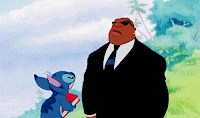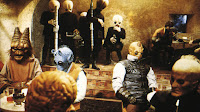Finally got this finished.
Endings are funny things, yeah? In a weird sort of way, we don’t get them much in real life anymore. We demand sequels to everything. Moving away doesn’t mean what it used to, not with Facetime or Twitter or any other messaging devices. Heck even death has been softened a bit, with social media accounts getting memorialized and lingering long after we’re gone.
And sometimes, people just throw on an ending because they can’t think of anything else.
The ending can make or break my story. It’s the rich, perfectly sweet dessert after a feast of savory words. I can have the absolute best filet mignon in the world paired with an exquisite wine, but if we end the meal with a pie made from rotten apples… well, that’s the part we’re all going to remember. A so-so story with a really fun ending usually gets favorable reviews. A strong manuscript that spirals downward at the end, more often than not, doesn’t go anywhere except into that big pile on the left.
Now, some folks are content to say “
well, that sucked” and leave it at that. But as storytellers we need to know
why something doesn’t work. Bad endings don’t always have the same root problem. Sometimes the writer had a phenomenal way to start a character arc, but wasn’t sure how to wrap it up. Or maybe they have a really cool idea for a story, but don’t know where to go with it past
that initial idea. Sometimes an ending just doesn’t work with the rest of the story.
And some endings almost never work, no matter what the rest of the story is. Endings like…
Nothing Changes
Let’s start with the basics. My characters are supposed to have an arc. Arcs end at
different points than they began at. If my last ten pages show the characters in the same place as the first ten, doing the same things, with the same people, and they’re not any wiser for what they just went through… well, that wasn’t much of an experience, was it? For them and probably not for my readers. I’m not saying my characters need to have some gigantic emotional breakthrough or spiritual growth, but
somethinghas to be notably different or this was all just wasted time.
One type of story that does this a lot is the “slice of life” tale. You know the one, just two or three average days in the life of two or three average people. It’s hard to say this kind of thing is wrong in a general sense. Most of our lives don’t change radically on any given day. I’ve spent most of today here at my desk writing, just like I did yesterday and probably like I’ll be doing tomorrow. So it’d be a realistic ending if a story about me ended with me back here working at my desk.
The question I need to ask myself is… why would anyone want to read about that? I know I sure wouldn’t. I already go through a slice of life every day where nothing changes.
The Heroes Don’t Do Anything
Every now and then, often enough that it’s worth adding to this list, I come across a weird story where the hero or heroes don’t save the day. Not that they lose they just… they aren’t the ones who bring the victory.
Somebody else saves the day, hits the target, makes the big sacrifice, or what have you. Imagine we’ve been watching Harry Potter for seven books and then Seamus Finnegan leaps in to fling that curse back at Voldemort and kill him dead. Which, y’know, yay Seamus and wooo! Voldemort’s dead, but at the same time… why’ve we been following Harry for the last two thousand or so pages?
 When I get to the end of my story, what’s my character actually doing? I mean, sure, pointing and shouting and worrying are all things you can do, but are they actually doing anything that’s directly affecting this outcome? Or is someone else doing it? And if it’s someone else… have we been following the wrong person?
When I get to the end of my story, what’s my character actually doing? I mean, sure, pointing and shouting and worrying are all things you can do, but are they actually doing anything that’s directly affecting this outcome? Or is someone else doing it? And if it’s someone else… have we been following the wrong person?
Everybody Dies and the Antagonist Wins
One of the biggest problems with ending things up this way is it gives my reader a sense the story was pointless. They’ve just invested a few hours (or perhaps days) into this tale only to see it come to an unpleasant ending. This can be especially frustrating if the reader comes to realize the character
never even had a chance at succeeding. It’s even more frustrating if my characters made a bunch of stupid decisions somewhere along the way. I mean, it’s bad enough when we have to watch the fifth person in a row decide to go check out
the old Murderama Amusement Park where all those kids got killed last summer, but when that’s the point I decide to end the story on…?
The Left FielderThis is the ending that comes out of nowhere. The quarterback finally gets his act together, aces his exams, convinces the cute girl from drama club that he really loves her, gets voted prom king but turns it down… and then
gets hit by a bus on the last day of school. Our heroine stops international terrorists working with alien invaders, but in the end her girlfriend accidentally drinks the tainted Soylent and is devoured by necrotic nanites anyway. Or, as I experienced many years back, a friggin’ hilarious ninety minute sketch comedy show ends with a bleak monologue about racial inequality and prejudice.
No, seriously. I worked on
a stage play back in the ‘90s that actually did this. The director and producer rewrote the end to give it “meaning” and couldn’t figure out why nobody liked it.
In my experience, the vast majority of writers who use this kind of ending are trying to achieve art. It’s me attempting to show how this story flawlessly mimics a random and sometimes meaningless real world by having a random and meaningless ending. It doesn’t relate to anything that happened because… it’s real. And tragic. And artistic.
Besides suffering from all the same issues as the “everybody dies” ending, the left fielder just isn’t that special anymore. It’s become one of the most common conclusions in indie films and “literature.” So besides making my audience roll their eyes so hard they sprain something, they’re probably going to see this “unexpected” ending coming for the simple reason that it’s just, well, expected at this point.
The Y’see TimmyThis one’s a little odd. I use this phrase here a lot, and it’s kinda an homage to the movie I found it in–
Speechless (written by Robert King). This ending gets its name from the old
Lassie TV show. Little Timmy encounters some problems, works his way out of them with Lassie’s help, and at the end Mom sits him down and explains what happened and why. “Y’see, Timmy, sometimes people get hurt or scared and it just festers down inside of them…” Timmy and the audience learn a little something about life and we all go home as better people.
The problem is, in clumsy hands the Y’see Timmy quickly becomes “brutally beating the audience with my message.” That’s why it’s on this list. A great example is Ayn Rand’s Atlas Shrugged, where the 98 page monologue (no, seriously) at the end of the book recaps every single one of the subtle lessons that were shown in the first 800 pages, but all dialed up to eleven-point-six. And if you know what I’m talking about, I’m betting you probably ended up skimming and/or blotting out most of that monologue. Just like everyone else did. Except Paul Ryan.
…And They Write a Book About It
I think I’ve mentioned
once or thrice before that this is pretty much the worst ending you can have for a screenplay. It isn’t much better in a book. This almost always feels like it’s tacked on ending to assure the reader that our hero didn’t just survive this story—they
benefitedfrom it. Immensely. Yeah, you’d think clearing my name of murder charges, getting the girl, and killing Thanos would be enough for most folks to consider it a good week, but noooooooo… apparently I need acclaim and wealth and celebrity, too.
I think writers tend to fall back on this ending for one of three reasons (sometimes more than one of them).
One is that it falls into that “write what you know” tip we’ve all heard for years and years. I know writing, so I’ll write about writing.
Twois that, because of
one, this feels like a natural thing to happen, so it adds
an element of reality to my characters and story. And
three…
Okay, I think three’s a sort of wish-fulfillment-validation thing, to be honest. Work with me here. My character writes a book about how she used to be a international assassin and it becomes a New York Times bestseller, right? So, logically, my book about someone writing a book about how she used to be an international assassin should alsobecome a New York Times bestseller. Right?
It Was All a Dream
Probably the worst offender of all of these. All too often the amazing tale of adventure ends with one of my heroes waking up on the couch or in a hospital bed. None of the story my audience has just invested their time and attention in actually happened. Not even within the world of the story. We all just put ourselves into a story about a person who was putting themselves into a story. The end.
As I mentioned up above with
Everyone Dies, this just tells the reader they made an investment for no reason. How often have you read or seen a movie like this and immediately been able to pick out the moment things veer off into a dream? My partner and I often watch shows or movies and find ourselves quickly declaring “Dream sequence!”
To Be Continued…
No, I lied. This is the worst offender. Hands down.
 We all want to write great, sprawling epics. Okay, maybe not all of us, but I’m sure a lot of folks here do. We want to write that massive series that spreads across at least six books and gets us an HBO deal. Starz at the least. But it just doesn’t happen this way.
We all want to write great, sprawling epics. Okay, maybe not all of us, but I’m sure a lot of folks here do. We want to write that massive series that spreads across at least six books and gets us an HBO deal. Starz at the least. But it just doesn’t happen this way.
There’s an ugly lie that races through writing groups and threads—the idea that publishers only want to buy series. First, that’s just not true. I know dozens and dozens of writers who’ve sold one-off books (myself included). Second… editors and publishers very rarely want a series. What they want is a book with series potential. A book that—if the preorders are good and word of mouth is great—I can easily write a sequel to. And another sequel. And maybe a fourth. Or even a fifth.
More to the point, as a beginning writer I need to convince agents and editors that I know what I’m doing. That I’m able to bring things to a satisfying close. So if my conclusion is “maybe I’ll end this in the next book”… well, that’s not going to score me points with anyone. Especially readers if that second book isn’t already a guaranteed thing.
Next time… well, heck. we’ve been talking about the end. Whaddya say we just kill a few people?
Until then… go write.
 Before I wrote fiction full time, I interviewed a lot of people. And one thing quickly became clear to me as I transcribed these interviews—real dialogue is a mess. When people talk in reality, they pause a lot and trip over their words and sometimes make false starts that they have to sort of go back over. They can drone on for several minutes at a time. They talk over each other. If you’ve ever looked at an unedited transcript of a conversation, you know that real dialogue’s the worst possible thing for fiction. Readers would claw their eyes out, and everything would take forever to say.
Before I wrote fiction full time, I interviewed a lot of people. And one thing quickly became clear to me as I transcribed these interviews—real dialogue is a mess. When people talk in reality, they pause a lot and trip over their words and sometimes make false starts that they have to sort of go back over. They can drone on for several minutes at a time. They talk over each other. If you’ve ever looked at an unedited transcript of a conversation, you know that real dialogue’s the worst possible thing for fiction. Readers would claw their eyes out, and everything would take forever to say.















